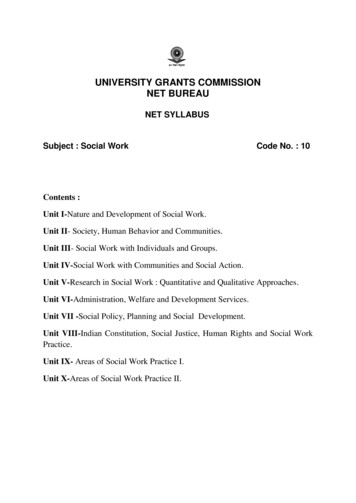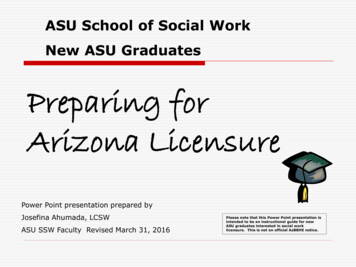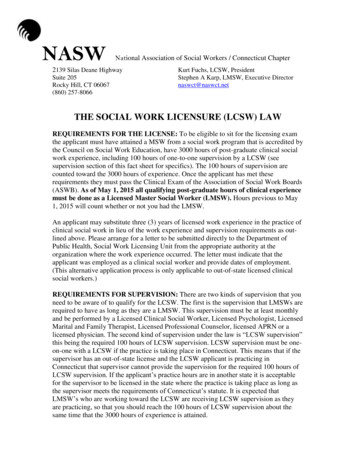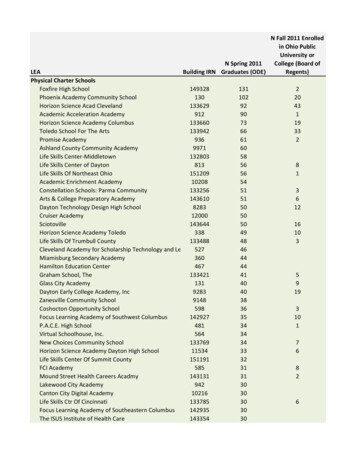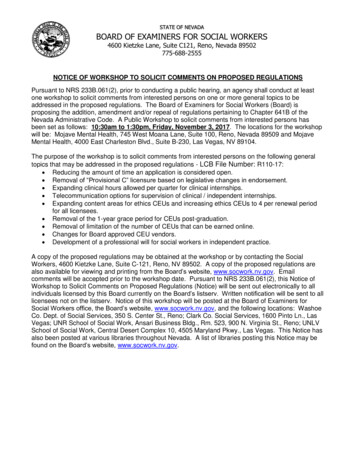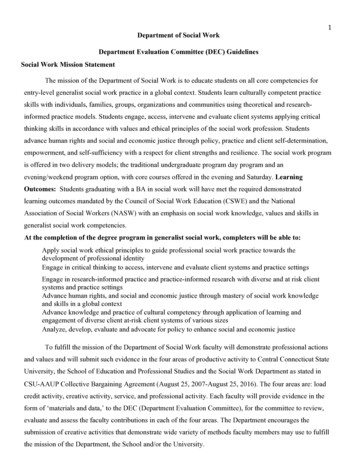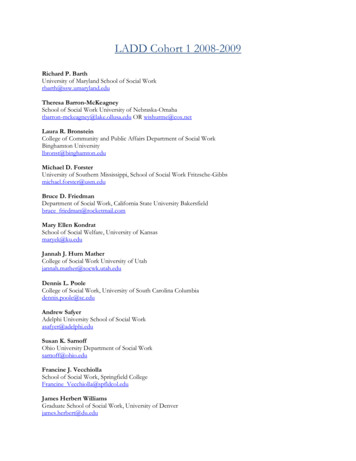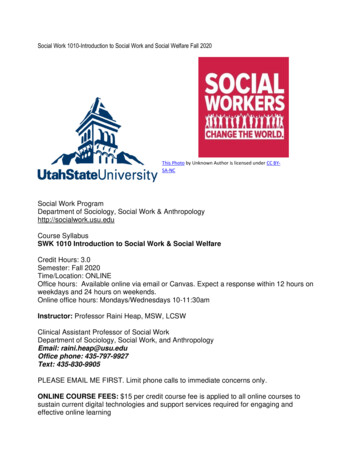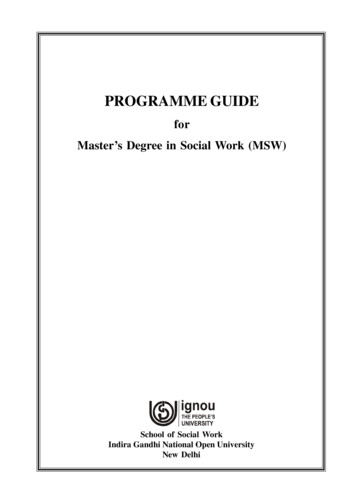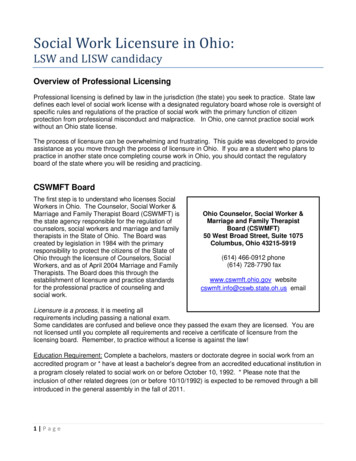
Transcription
Social Work Licensure in Ohio:LSW and LISW candidacyOverview of Professional LicensingProfessional licensing is defined by law in the jurisdiction (the state) you seek to practice. State lawdefines each level of social work license with a designated regulatory board whose role is oversight ofspecific rules and regulations of the practice of social work with the primary function of citizenprotection from professional misconduct and malpractice. In Ohio, one cannot practice social workwithout an Ohio state license.The process of licensure can be overwhelming and frustrating. This guide was developed to provideassistance as you move through the process of licensure in Ohio. If you are a student who plans topractice in another state once completing course work in Ohio, you should contact the regulatoryboard of the state where you will be residing and practicing.CSWMFT BoardThe first step is to understand who licenses SocialWorkers in Ohio. The Counselor, Social Worker &Marriage and Family Therapist Board (CSWMFT) isthe state agency responsible for the regulation ofcounselors, social workers and marriage and familytherapists in the State of Ohio. The Board wascreated by legislation in 1984 with the primaryresponsibility to protect the citizens of the State ofOhio through the licensure of Counselors, SocialWorkers, and as of April 2004 Marriage and FamilyTherapists. The Board does this through theestablishment of licensure and practice standardsfor the professional practice of counseling andsocial work.Ohio Counselor, Social Worker &Marriage and Family TherapistBoard (CSWMFT)50 West Broad Street, Suite 1075Columbus, Ohio 43215-5919(614) 466-0912 phone(614) 728-7790 faxwww.cswmft.ohio.gov websitecswmft.info@cswb.state.oh.us emailLicensure is a process, it is meeting allrequirements including passing a national exam.Some candidates are confused and believe once they passed the exam they are licensed. You arenot licensed until you complete all requirements and receive a certificate of licensure from thelicensing board. Remember, to practice without a license is against the law!Education Requirement: Complete a bachelors, masters or doctorate degree in social work from anaccredited program or * have at least a bachelor’s degree from an accredited educational institution ina program closely related to social work on or before October 10, 1992. * Please note that theinclusion of other related degrees (on or before 10/10/1992) is expected to be removed through a billintroduced in the general assembly in the fall of 2011.1 Page
Steps toward LSW Licensure:1. To begin the licensing process you complete the license application online or paper version(keep job descriptions brief) and pay the 60.00 application fee to the Counselor, SocialWorker & Marriage and Family Therapist Board (CSWMFT). This application is good for twoyears.2. Submit the Request for Exam Pre-Approval form: http://cswmft.ohio.gov/pdfs/LSWInstr.pdf oremail to andy.miller@cswb@state.oh.us with a copy of your driver’s license and the following: Letter of good standing from your school if you are in your last term of a social workprogram OR a copy of your degree or unofficial transcripts, if you have graduated.3. Once your application, pre-approval form, unofficial transcript and copy of your driver’slicense or State ID has been received in the Board’s office, your file will be reviewed for exampre-approval. Within 7 to 10 business days your exam pre-approval will be sent through e-mail(or US Mail if requested) instructing you to contact the Association of Social Work Boards(ASWB). The next section will contain further information about ASWB and the examcandidacy process.4. You will then contact ASWB using the information you will be sent by the state licensing boardto schedule the exam. If you have failed the exam or your pre-approval has expired complete anotherrequest for exam preapproval you will not need to re-send a copy of your driver’slicense or unofficial transcript. There must be a 90 day wait period between thetwo exams.5. Pass the board’s online Laws & rules exam www.cswmft.ohio.gov/exam/default.aspx6. Have your school MAIL or submit through electronic delivery OFFICIAL transcripts, showingyour degree conferred, directly to the board.7. Complete the BCII and FBI criminal records check. Be sure to carefully follow the instructionsfound at www.cswmft.ohio.gov/pdfs/CRC0308.pdf.Documents required for completing your LSW Licensure file:1.2.3.4.5.LSW application with feeASWB Exam ResultsBoard’s online Laws and Rules certificateOfficial Transcript mailed directly from your schoolBCII and FBI Criminal Records CheckYou can find all of their forms and instructions at the following address:http://cswmft.ohio.gov/FormsS.stm#4.If you have questions during the process, call the Board. At the following site you will find a list of staffmembers and their direct phone lines http://cswmft.ohio.gov/staff.stm as well as email addresses.2 Page
Steps toward LISW Licensure:Requirements: Completion of a master’s degree in social work from a CSWE accredited programand a minimum of two years post MSw and post LSW experience and 150 hours of supervision by aLISW-S. ,1. To begin the licensing process you complete the LISW application online or paper ult.asp (keep job descriptions brief) and pay the 75.00 application fee to the Counselor, Social Worker & Marriage and Family TherapistBoard (CSWMFT). This application is valid for two years.2. If you did not take the Clinical or Advanced Generalist exam for your LSW, then submit theRequest for Exam Pre-Approval form: http://cswmft.ohio.gov/pdfs/LISWExInst.pdf or email toandy.miller@cswb@state.oh.us with a copy of your driver’s license and the following: Letter of good standing from your school if you are in your last term of a social workprogram OR a copy of your degree or unofficial transcripts, if you have graduated butthe Board does not have your MSW/MSSA transcripts on file.3. Pass the board’s online Laws & rules exam www.cswmft.ohio.gov/exam/default.aspx (theLaws and Rules certificate is valid for one year).4. If the Board does not have your MSW/MSSA transcripts have school mail or submit throughelectronic delivery official transcripts, showing your degree conferred, directly to Board.5. Complete the BCII and FBI criminal records check. Be sure to carefully follow the instructionsfound at www.cswmft.ohio.gov/pdfs/CRC0308.pdf. Criminal records checks are valid for oneyear).6. Your training supervisor must submit the Professional Employment Reference form, which canbe found at http://cswmft.ohio.gov/pdfs/ISW Reference.pdf documenting you have completedthe following: Two full years and 3,000 hrs of experience which converts to at least 24 months with aminimum of 1,500 hours per year. IF you have more than 1,500 hours per 12 monthperiod the excess cannot be carried over to the next 12 month period. If you aregetting your experience part-time, the second year cannot begin until you havereached the 1,500 hour minimum. Supervision should average one hour of individual or group supervision for every 20hours of experience with a minimum of 150 hours of supervision for the 3,000 hours ofsupervised social work practice. Supervision shall be provided by an LISW-S unless ahardship request is granted.Documents required for completing your LSW Licensure file:1.2.3.4.5.6.LISW application with feeASWB Clinical or Advanced generalist exam ResultsBoard’s online Laws and Rules certificateOfficial Transcript mailed directly from your schoolBCII and FBI Criminal Records CheckProfessional Employment Reference(s)Note: You may be requested to submit your supervision logs; DO NOT send in supervisionlogs unless requested.3 Page
ASWBOnce you are approved by CSWMFT Board totest you will contact Association of Social WorkBoards (ASWB) to pay for exam, and then you areable to schedule to take the exam. ASWB is theassociation of regulatory boards (boards such asthe Counselor, Social Work, Marriage and FamilyTherapist Board in Ohio) that oversee social work.The Association owns and maintains the socialwork examination which is currently used in everystate in the US as well as in some Canadianprovinces.Association of Social Work Boards(ASWB)400 South Ridge Parkway, Suite BCulpeper, VA 22701(800) 225-6880 toll free(540) 829-6880 phone(540) 829-0142 fax(888) 579-EXAMCandidate Registration Center“ASWB is an organization devoted to consumerprotection, which is the purpose of licensing and(888) 332-EXAMprofessional regulation. Licensing exists toHearing impaired candidateprovide state and provincial governments with aregistration/TT.way to verify that a social worker has the skillsand knowledge necessary to provide a safe levelof practice. Licensing also establishes social workpractice as a separate and distinct branch of mental health services, and gives governments a way tomonitor the professional conduct of social workers.” (ASWB Examination Candidate Handbook)Information about registration for the exam can be found athttp://www.aswb.org/SWLE/registrationinfo.asp or call the toll free number (800) 225-6880. Thewebsite will provide critical information as you go through this process.Very helpful information can be found in the candidate’s handbook that will walk you through theprocess. The handbook is located at http://www.aswb.org/pdfs/handbook.pdfDisability Test AccommodationsIf you have a disability you may be eligible for testing accommodations. You will find theaccommodation request in the Candidate’s Handbook or at www.aswb.org which must be completedand sent to ASWB for approval prior to taking the test.NASWNational AssociationOf Social Workerswww.socialworkers.orgNASW, OH Chapter614-461-4484www.naswoh.orgLicensing boards exist to protect the public; they are not anadvocate for the social worker. If you are seeking help andneed an advocate, you will find that through yourprofessional association, The National Association of SocialWorkers (NASW).There are numerous services you will receive as adeveloping professional social worker. When you join youwill be a member on a national, state chapter, and localregional level providing you resources on each level.4 Page
NASW, Ohio Chapter will assist you with questions and concerns during each phase of yourprofessional development, from assisting you through the examination period by providing licensurereview courses to answering questions and concerns as you prepare and sit for your exam.Which exam do you take?Exam CategoriesIn Ohio there are three licensing levels, Licensed Social Worker (LSW) and Licensed IndependentSocial Worker (LISW), and Licensed Independent Social Worker with Supervisor Designation (LISWS).You may find determining which exam to take confusing. Remember, this is a national exam andeach state has its own unique requirements and licensure levels.In the State of Ohio if you are seeking your independent license the Ohio Counselor, Social Worker,and Marriage and Family Therapist Board does not dictate which of the following two exams to take:Advanced Generalist or Clinical.Choosing your ExamExamCategoriesOhio LicensureAssociateNot accepted in Ohio for any licensure level.BachelorsLSWDescriptionsThose with a social work undergraduate degree; or a master’sdegree who are seeking their LSW.MastersNot accepted in Ohio for any licensure level unless someone took the test inanother state then this would be accepted for LSW licensure.AdvancedGeneralistLISW –candidatechoosesbetween the twotests categories.ClinicalExamFee 230*Advanced test for social workers with an MSW or MSSA and atleast two years of post-degree experience in non-clinicalsettings. 260*Advanced test for social workers with an MSW or MSSA and atleast two years of post-degree experience in direct clinicalpractice settings. This exam is required if you are applying formost HRSA loan repayment programs. 260** Additional fee for changes to exam registration - 30.00Test CentersSchedule your exam. Once you have been approved to take the test the next step is to scheduleyour examination. In January, 2011 ASWB changed test centers to Pearson VUE Centers. Onlineyou can find test centers in your area and make your reservations at www.pearsonvue.com/aswb 24hours a day or by phone at 1-877-844-9537. Call center hours are 8:00 am to 11:00 pm Eastern TimeMonday through Friday, 8:00 am to 5:00 pm Eastern Time Saturday, and 10:00 am to 4:00 pmEastern Time Sunday. Appointment information can be found atwww.aswb.org/pdfs/AppointmentInformation.pdf. Again, you will receive the information to schedulethe exam once you have been approved by the licensing board.5 Page
What to expect at the test center? A helpful video tour of the test center is provided atwww.pearsonvue.com/ppc which walks you through the process while showing you various areas ofthe testing center. This video may be very helpful in preparing you for the day of the exam.Arrival time and what to bring. As outlined in the materials about testing, be sure that you note thatyou will need to arrive at the test center 30 minutes before your scheduled appointment. At that timeyour picture will be taken and your palms scanned. It is important to have two forms of ID, with onecontaining your name, a permanently affixed photo, and signature – and has not expired (on thewebsite you will find the forms of ID’s accepted.** If you do not arrive on time or with proper ID, you will not be allowed to take the test and you willforfeit the examination fee.Testing Begins. There will be a 20 minute tutorial once that ends the test begins as well as theclock. You will have four hours to complete the exam. There are no scheduled breaks. You maytake a bathroom break at your discretion, but the clock will continue during this break. It is highlysuggested that you take care of personal needs prior to entering the testing area.The exam is given on a computer; there are 170 with only 150 of those questions being countedtoward your score. The other 20 are pre-test questions that are being evaluated for possible inclusionin future exam pool. These questions are scattered through-out, so you will not know which are pretest questions.You will be given four hours to complete the exam, unless you have been approved by ASWB forspecial accommodations due to a disability that includes an extended timeframe.The ExamThe exam utilizes an objective assessment, multiple choice or true/false items. If your course workhas assessed you primarily through subjective (i.e. essay) methods you will need to gain someunderstanding in how to increase your chances of performing well and practice multiple choicequestions. Consider how you learned to ride a bike, reading manuals may have been helpful to beginthe process, but it took practice to ride a bike. This too will take practice.Understand the structure of the multiple-choice test, how to think through the process of elimination,and selecting the best choice among those provided. Remember, you are choosing between thoseprovided.Some strategies to practice:6 Page Read and analyze the question carefully. One of the most common exam errors occurwhen the participant fails to accurately or thoroughly read the question. Read through all of the choices. Eliminate the options you know to be incorrect –generally that leaves you with two to ponder. Give each option “a true-false” test which may reduce you to the best answer.
If two alternatives seem correct, compare them for differences then, refer to thequestion looking for key words. What is the key word(s) in the first part of the multiple-choice problem? Look forqualifiers such as most, first, least, all except, etc. Think about the setting. Where are you, who are you (school social worker, mentalhealth social worker, case manager, etc ), who is the client? Don’t read anything into the question. Remember this is a national test, so the answer will not be specific to state or agencypolicy. Don’t leave anything unanswered. Guess and mark something.Exam Content AreasThe ASWB exam is organized around content areas, under which competencies are described thatdefine the knowledge, skills, and abilities of the social worker within that content area. You can findthe pdf that outlines the content areas, competencies, and knowledge, skills and abilities statements(KSAs) for the bachelor’s exam at www.aswb.org/pdfs/BachelorsKSAs.pdf.Bachelors ExaminationContent AreaHuman Development,Diversity, andBehavior in theEnvironmentAssessmentDirect and IndirectPracticeProfessionalRelationships, Values,and Ethics7 PageCompetencies Models of human growth and developmentModels of human behavior and the social environmentDiversityEffects of the environment on client system behavior Social history and collateral dataProblem identificationAssessment of client system’s strengths and challengesAssessment of addictive behaviorsAssessment of mental and behavioral disordersDynamics and indicators of abuse and neglect Indicators and effects of crisis and changeIntervention processes and techniquesMatching intervention with client system needsUse of collaborative d practiceEthical responsibility to client system and professionConfidentialityClient’s right to self-determinationProfessional use of selfMethods of professional development% ofexam27%28%26%28%
The Clinical ExamContent AreaCompetencies% ExamHuman Development, Diversity andBehavior in the Environment Human Development in the Life CycleHuman Behavior in the EnvironmentEffects of DiversityAddictions31%Assessment, Diagnosis andTreatment Planning Information GatheringAssessment and DiagnosisTreatment Planning26%Psychotherapy, ClinicalInterventions, and CaseManagement Therapeutic RelationshipThe Intervention ProcessManagement of casesConsultation and Interdisciplinary collaboration25%Professional Ethics and Values Ethical IssuesConfidentiality and its limitsValue The Advanced Generalist ExamContent AreaCompetencies% ExamHuman Development,Diversity and Behaviorin the Environment Models of Human Growth and development through the LifespanModels of functioning of various systemsEffects of the environment on Systems’ BehaviorDiversity, Discrimination, and Stereotypes18%Micro Assessment andPlanning Use of assessment instruments and methodsUse of social historyImpact of life stressors on systemsIntervention planningAssessment of strengths and challengesIdentification of common indicators of risks and disorders22%Micro Practice andSocial WorkRelationships Application of theories, methods, and processes to micro systemsMicro intervention techniquesDynamics of the social worker-client relationshipApplication of evidence-based practices18%Macro Practice Research Methods and DesignProgram Evaluation and OutcomesRecordkeeping and reportingProgram Development and Service Delivery SystemsInterdisciplinary CollaborationPolicy Analysis and AdvocacyTheories and Methods of Social ChangeAdministration and ManagementSupervision and consultation. Risk Management18%Professional Valuesand Ethics Values, Boundaries, and l Responsibilities for ethical listKSAs.pdf8 Page
Review the KSAs, knowledge, skills, and abilities, under each of the competencies in the KSA bookletfrom ASWB; these will assist you in preparing for the exam.Content:The content area is broad. Use the KSA booklet and create outlines or tables to compare andcontrast content areas. For example, Human Development, Diversity, and Behavior in theEnvironment are 27% of the exam. Refresh your memory on the models of human growth such asinformation by creating a table like the one below. Do you have a grasp of these stages?Developmental StagesAgestBirth – 1 yrst1 yrnd2 yrrdth3 -5th6 -pubertyAdolescenceEarly AdulthoodMiddle AgeOld Age9 ital StageErickson’s crisesTrust versus MistrustAutonomy versus Shame, DoubtIndustry versus InferiorityIdentify versus Role ConfusionIntimacy versus IsolationGenerativity versus StagnationIntegrity versus DespairPiaget’s Stages of CognitiveDevelopmentBirth to 2 yrs. - Sensorimotor2 to 7 yrs - Preoperational7 to 11 yrs – Concrete OperationalOver 11 yrs. Formal Operational
PreparationPrior to the testHave a schedule of review and practice time; practice taking exam questions as well as relaxationtechniques. Develop good study habits and strategies. Learn and implement good timemanagement strategies, especially in regards to dealing with outside pressures. Organize yourmaterial to be studied, when you are going to study, how you are going to study.The key is finding techniques that work for you. What is your learning style? What relaxationtechniques work for you? Remember, practice is essential. Practice test taking as well asrelaxation techniques.Study Tips: Make sure you understand what areas, skills, and knowledge will be evaluated on the testFocus your studying efforts on your weakest areasBuy the summary study guides or borrow from a friend who already took the examSet up a schedule to organize your studying accordinglyTake practice tests!When to schedule your exam.Schedule to take the exam at a time of day you are most focused. If you are a morning person,schedule it in the morning not in the afternoon when you find yourself feeling sluggish and sleepy.The same applies to the person who functions poorly in the mornings, schedule your exam in theafternoon when you are most awake.The day prior to the exam.Don’t use this day to cram before the test. It is time to collect yourself and make sure you haveyour Authorization letter, two forms of identification with one having a photo, and directions. It isbest to have done a trial drive to the location. Go to bed early!10 P a g e
Tips for Day of the Test Set your alarm and get up early.Wear comfortable clothes and shoes. It is best to dress in layers in order to adjust to thetemperature of the exam room.Take a bottle of water and possibly a simple healthy snack for your 5 minute break.Don’t go to the exam with an empty stomach. Foods that are recommended to reducestress are fresh fruits and vegetables.Approach the exam with confidence. Use whatever strategies you can to personalizesuccess: visualization, logic, talking to yourself, practice, team work, journaling, etc.Arrive at the test site early, approximately 30 minutes before you are scheduled to begin.Use the bathroom before entering the exam area. Practice your relaxation techniques.Pace yourself through the exam. After completing the first 10 questions, check to see howmuch time has elapsed.Take a 5 minute break mid-way the exam to go to the bathroom, drink some water, and reground yourself through stretching and breathing exercises.Change positions to help you relax.Read instructions carefully.Notice the key concepts. Look for qualifiers such as.o Mosto Noto Excepto Best Read the multiple choices carefully Start by eliminating options that you know are incorrect. Don’t jump to conclusions. Use discretion. Choose the answer that is most specifically and directly relevant to the care presented. Don’t expect “trick” questions. The pattern of the correct response options is left to chance. Take each question on itsown merits. If you’re unsure of an answer, make your best guess and then mark to review. DO NOTLEAVE UNANSWERED! If you still don’t know the answer after coming back to a question you were unsure ofearlier, stick with your original guess. Don’t become distracted or unnerved when other candidates leave before you. Everyonehas their own pace. Anxiety is like the air in a tire – you need a sufficient amount to roll - to stay focused andmotivated, see it as a source of energy. Too much and it reduces your ability to focus.See the following section on relaxation techniques to address anxiety when it becomes adistraction.Resources:Berkley Training AssociatesAssociations for Advanced Training in the Behavioral Sciences11 P a g e
Relaxation techniques:Expect some anxiety, it is normal, and can provide energy. It is all about finding emotional balanceand keeping it manageable.When you are finding yourself overly stressed, where the stress is interrupting your ability toconcentrate, you will need to take a few minutes to refocus and reduce your test anxiety. Here aresome helpful tips: Relax, you are in control. Take slow, deep breaths. You cannot deep breath and feelanxious at the same time. Breathe like a baby, where the breath-in expands the abdomenand you slowly release through your chest. Good breathing techniques take practice. Youmay also want to create a mantra to address negative thoughts that may bombard you. Amantra may be simply, “I am prepared” or use other positive self-talk to calm and refocus,or a mental image of place you find peaceful. Don’t think about the fear. Think about the next step and keep on task, one step at a time.Stay focused! Use positive reinforcement. Acknowledge that you have studied and you are doing yourbest. It is critical to practice techniques prior to when you need them! Just as you were preparedon content area – you need to be prepared to handle your anxiety when it becomes out ofcontrol. During your practice exam sessions, include relaxation techniques. If you know test anxiety has caused you problems in the past, you may wish to consult witha specialist that can assist you in developing and adopting techniques that will work foryou.12 P a g e
Frequently Asked Questions to the CSWMFT BoardWhat is the minimum score needed on the examination?Answer. A scaled score is applied with a passing score of anywhere from 94 – 107 correctanswers.Are there a limited (maximum) number of attempts at passing the examination?Answer: NO. You may take the examination up to four times. After the fourth attempt, if theapplicant has not achieved a passing score the Board will ask for you to submit a remediationstudy plan.I am planning to move to another state. Should I still take the examination in Ohio? How do Ifind out about licensure requirements in other states? Will they generally accept an OhioLicense?Answer: To find out about licensure in another state, contact the state licensure board you willbe re-locating and the NASW Chapter office that can provide information about licensure. Forinformation on another states’ licensure process, exam requirements, etc, go to thewww.aswb.org and click on the link to Other Resources. From there, click on the link toRegulator Boards.If I take the license exam and fail it, how long will I have to wait before I can take the examagain?Answer: If you fail the examination, you must wait at least 90 days before taking anotherexamination. Re-registration will require another payment of the exam fee.I have been offered a job requiring a license. They want me to start immediately aftergraduation. I do not have any license yet. Can I practice without a license for a period of timebefore I get my license?Answer: No. In Ohio, you cannot practice social work for any period of time without a licenseand it is a violation of the Ohio Revised Code for you to practice without a license. You canobtain a temporary license that will allow you to practice social work prior to receiving yourpermanent license by following these requirements:a. Submit a temporary licensure application along with the appropriate fees.b. The applicant must have passed the examination, obtained a Criminal Records check,completed the laws and rules exam, and be able to provide proof of graduation prior tothe issuance of the temporary license.c. The temporary license will allow the applicant to work legally in Ohio during the periodwhich it is in effect.What is the scope of practice for a LSW?Answer: The scope of practice of a social worker is as follows:(A) A social worker may perform for a fee, salary, or other consideration, counseling andpsychosocial interventions without supervision; and social psychotherapy under thesupervision of an independent social worker, a professional clinical counselor, apsychologist, a psychiatrist, or a registered nurse with a master’s degree in psychiatricnursing.13 P a g e
(B) When practicing as an employee of a private individual, partnership, or group practice,a social worker may perform for a fee, salary, or other consideration, counseling,psychological interventions, and social psychotherapy only if supervised by anindependent social worker, a clinical counselor, a psychologist, a psychiatrist or aregistered nurse with a master’s degree in psychiatric nursing.I have a friend who has passed the examination but has not received notification that she islicensed. She has heard that once she passes the examination she can put LSW after hername. Is this True?Answer: In Ohio, no person shall use the title “social worker (LSW)” or any other title ordescription incorporating the words “social worker: or any initial used to identify persons actingin those capacities unless the person is currently authorized by licensure or registration underthis chapter to act in the capacity indicated by the title or initials.14 P a g e
Other resources:The NASW Social Work Dictionary, NASW Code of Ethics, and the NASW Social Work Encyclopediaare significantly helpful in preparation for licensure.WebsitesNASW http://www.socialworkers.org/The social work test prep site has useful information - www.socialworktestprep.com. It maytake you to sites that pop up difficult questions that may than scare you into buying products.Just beware of this hook and use what is free.ASWB provides study guides. http://www.aswb.org/SWLE/studyguides.aspSocial Work Exam prep blog. http://socialworkexamreview.blogspot.comBlo
Ohio through the licensure of Counselors, Social Workers, and as of April 2004 Marriage and Family Therapists. The Board does this through the establishment of licensure and practice standards for the professional practice of counseling and social work. Licensure is a process, it is me
